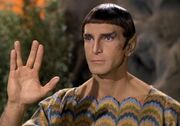(covers information from several alternate timelines)

Surak, Vulcan philosopher, logician, and pacifist
Pacifism was the ethical position that violence and war were immoral. Strict pacifists refrained from all forms of violence, while restricted pacifists made some exceptions, for example, in cases of self-defense.
Pacifism often arose out of a respect for other forms of life, even hostile ones. As such, tendencies of pacifism and vegetarianism often overlapped.
Sometimes pacifism was tied to religious beliefs, but this was not necessarily the case. As with Vulcans, secular ethics based on pure reason could result in pacifism.
Pacifists were often looked down upon by warrior races such as the Kzinti. (TAS: "The Slaver Weapon")
One who attempted to maintain peace was known as a peacekeeper. In 2258 of the alternate reality, Admiral Alexander Marcus questioned whether Khan Noonien Singh had claimed to be a peacekeeper, saying he and his cronies were in fact war criminals. (Star Trek Into Darkness)
In the late 1930s of an alternate timeline created by Leonard McCoy's escape through the Guardian of Forever, Edith Keeler lead a pacifist movement that delayed the United States' entry into World War II, thereby giving Germany the time they needed to develop the atomic bomb first and win the war. (TOS: "The City on the Edge of Forever")
Kestra Troi-Riker identified as a pacifist. (PIC: "Nepenthe")
Pacifist races[]
- Aenar
- Angosians
- Argelians
- Ba'ku
- Grazerites
- Halkans
- Mari
- Metrons
- Mizarians
- Organians
- Vulcans (insofar as they followed the teachings of Surak)
Pacifist individuals[]
- Albert Einstein
- Carl Sagan
- Edith Keeler
- Hemmer
- Kestra Troi-Riker
- Kevin Uxbridge
- Kova Tholl
- Lissan
- Mahatma Gandhi
- Riva
- Spock
- Spock of the mirror universe
- Surak
- Syrran
